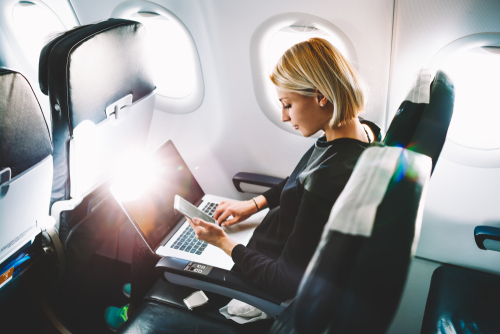|
|
After the traditional summer travel season ended, airline bookings remained strong, airlines reported.
Instead of sales drying up between Labor Day and Thanksgiving, people kept flying in September, United Airlines said.
The reason: the work-from-anywhere revolution is allowing people to take their jobs with them, leaving them free to take more trips that combine business and pleasure, according to airline executives.
As a result, September was United’s third best month ever for revenue per seat-mile flown, a standard measure of airlines’ financial health, the carrier reported, and said that October looks to outperform September.
“There’s been a permanent structural change in leisure demand because of the flexibility that hybrid works allows,” United CEO Scott Kirby said last week in a call with reporters and analysts.
“This is not pent-up demand,” he added. “It’s the new normal.”
As a result, passengers are spreading out their trips, helping to keep flights more full during the week. Holiday travel also is spreading more widely across the calendar, The New York Times noted.
Business travel is also on the rise, flying on the strong dollar as nations reopen after COVID lockdowns, which we reported in “Airline Travelers Ignore Inflation, Higher Ticket Prices” (18 Oct 2022).
Corporate travel across the Atlantic Ocean is outpacing domestic business junkets, Andrew Nocella, in charge of United’s business travel, said in the call. “A Zoom meeting is simply less practical in a global setting,” he added.
Delta reported more transatlantic flights scheduled this month than in October 2019. Both Delta and United are preparing for a surge in travel to and from Japan now that the country has reopened.
American Airlines reported a slower return of travelers from major corporations, but that has been more than made up for by trips by smaller businesses and “blended trips” among remote workers, the company said.
Those smaller customers actually are more profitable, American told The New York Times, because they tend to buy premium seats and take part in loyalty programs or apply for branded credit cards.
Branded credit cards charge higher interest rates than regular bank cards.
Air carriers have faced delays in receiving new aircraft ordered during the COVID War, but even that has been a benefit, the companies said: fewer planes means fuller flights on the planes in service.
The airlines also said that air travel could be even busier if not for a lack of air traffic controllers and government delays in approving visas for foreign visitors, the NYT noted.
TREND FORECAST: We maintain our forecast that business travel will not rebound to pre-COVID War levels. Working from home is now a part of the new normal. Kastle data which tracks office occupancy rates across the globe reports that occupancy rates are half of what they were before the COVID War. And the Freespace index which tracks big corporations office use reports that around the world, occupancy is about half of what it was before the COVID War for both work space and meeting rooms. Yes, “meeting rooms,” meaning less people meeting whether as part of the corporation or business meetings with clients, prospects, etc.

